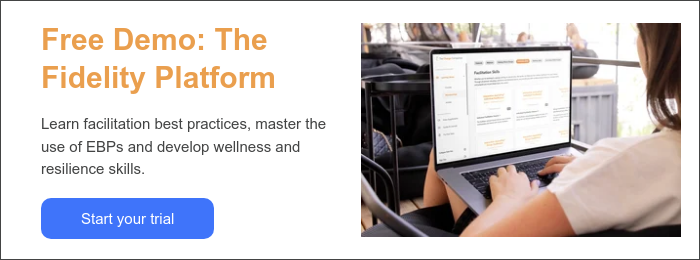Motivational interviewing techniques: Asking the right questions

Asking the right questions in a counseling setting can help a participant on their journey toward positive behavior change – but asking confrontational questions can have the opposite effect, causing a participant to justify negative behaviors. With a lot on the line, where do you begin?
Motivational interviewing includes using targeted questions to evoke participants’ own Desires, Abilities, Reasons and Needs for change (DARN). Asking the right kinds of questions eases facilitation by helping participants increase their arguments in favor of positive change.
An evidence-based counseling method designed to resolve ambivalence and elicit self-efficacy and behavior change.
A participant’s belief in their ability to achieve their goals.
An acronym that stands for a participant expressing their Desires, Abilities, Reasons and Needs – also known as “change talk”.
Facilitation is all about asking the right questions. First, beware of the killer questions...
- Why don’t you want to?
- Why can’t you?
- Why haven’t you?
- Why don’t you…?
- And the ultimate killer statement… You should!
The goal is to ask questions that participants will likely answer with change talk, or DARN language.
Desire questions:
What do you hope to accomplish in this program?
How do you want your life to be different one year from now?
What is the most important thing in your life today that you want to change?
Ability questions:
What gives you confidence that you will be successful in this program?
If you decided to change, how could you do it?
What are you willing to try in order to make this change?
Reason questions:
Even if you are not ready to make changes today, if you were to change, what would be
three reasons for making changes?
Why do you want to change?
What would be some of the advantages of this change?
Need questions:
How important is it for you to make this change? (on a scale of 1 to 10, with 1 being
not important and 10 being extremely important)
What needs to happen in order to make this change?
How serious or urgent does this feel to you?
These types of MI questions focus responsibility for decisions about change with each participant, highlighting their sense of autonomy, freedom of choice and control.
Good and Bad Questions: the Dos and Don’ts
Do ask open-ended questions that encourage the participant to come up with their own solutions and reasons for changing.
You say you never want this to happen again. What are three things you could do beginning today to make sure that wish comes true?
Do ask questions that encourage participants to find their own reasons for making changes in their behavior.
What would be the worst thing that would happen to you if you continue on your current path?
Do have a collaborative relationship with your participants, inviting them to take an active role in their behavior change.
I believe you know what is best for you and what is the correct action to take. Can we work together to find those solutions?
Do be reflective and empathic when speaking with your participants.
It is difficult making life changes, especially changing familiar activities and people you spend time with.
Do support a participant’s self-efficacy.
If you are willing to do the work, I am positive you will be successful in this program.
Don’t provide participants with the solution to their challenges.
If you really want to change, all you need to do is follow the steps of this program.
Don’t ask questions that lead the participant to focus on the status quo.
It sounds like you have a lot of fun on your current path. What else do you enjoy about where you are now?
Don’t be judgmental or confrontational.
I decide whether you pass this program, so if you’re smart you’ll do what I tell you.
Don’t assume you know what is best for the individual.
I know what you need. You need to stay away from those so-called friends of yours.
Don’t contribute to the participant’s anger, fear or discouragement.
I’m pretty good at knowing people, and I doubt you’re going to make it in this program.
The evidence-based practice of Interactive Journaling® was created by The Change Companies with the assistance of more than 250 professionals in the health and human services fields. Interactive Journals are designed to engage participants and hold their interest as they learn evidence-based methods for self-change. Every Interactive Journal also has an accompanying Facilitator Guide, full of evidence-based activities, discussion topics and motivational questions. We’re here to not only help the end user, but also to walk alongside providers and facilitators and make your job as streamlined as possible.



